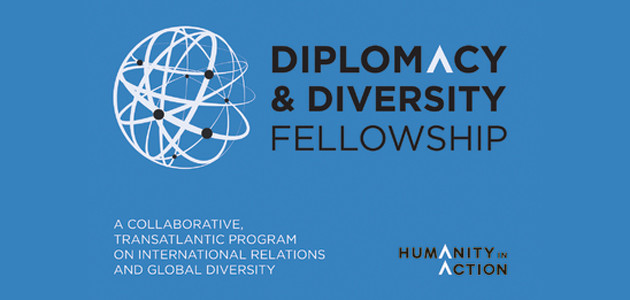On June 9, 2015 an international group of emerging leaders visited the Federal Academy as part of a field trip in order to acquaint themselves with Germany’s novel orientation in foreign and security policy.
 Illustration: Humanity in Action
Illustration: Humanity in Action
Involving emerging leaders in the security policy dialogue is a key concern for the Federal Academy for Security Policy (in German “Bundesakademie für Sicherheitspolitik”, or BAKS for short). On June 9, 2015 a group of 30 young leaders visited the academy in order to discuss both the foundations of German security policy as well as perspectives for NATO. The visitors are participants of the “Diplomacy and Diversity Fellowship” program, which was originally founded by the American minority and human rights organization “Humanity in Action”. The fellows are (doctoral) students at American and European elite universities, such as Harvard University MA or London’s Kings College, and are completing the one month long fellowship program with a fieldtrip from Washington, D.C. via Paris to Berlin. The aim is to promote an understanding for the interconnectedness between different policy areas and actors, as well as to promote international dialogue.
Comparing Berlin’s outlook to those of Paris and Washington DC
During their visit to the BAKS the fellows learnt about the new orientation of German foreign and security policy that has been formulated by the German president and ministers at the Munich Security Conference. Moreover the young leaders debated with Karl-Heinz Kamp - the Academic Director at the BAKS - about the changing global environment that is resulting from the Russian aggression against Ukraine and the turmoil in the Middle East. In this context the developments in Eastern Europe, especially the deteriorating relationship between Russia and NATO, are possibly not only a “passing storm” but present a foundational shift in the security climate.
The dramatic developments in the Middle East and Northern Africa (MENA) region are more than just crises: They reveal a trend of the dismantlement of statehood, in which the existing means of conflict management and civil or military intervention no longer suffice. This puts the liberal world order and the rule of law at risk. Analyzing such trends, drawing conclusions from them, and communicating these to civil society will be a key task for the “young leaders”.
Author: Federal Academy for Security Policy
